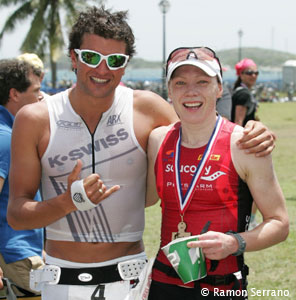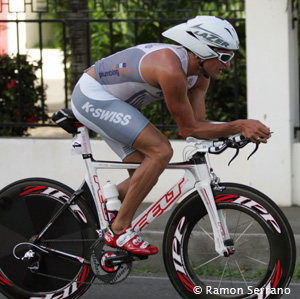Show Me The Money

The updated 8% prize money rule at WTC events has impacted quite a few athletes this year, but nowhere more than at the recent Ironman 70.3 St. Croix where 9 men, but only 2 women, got paid. These two female pros walked with much larger paychecks than their male counterparts.
Until this year if a pro racing Ironman or 70.3 WTC events did not finish within 8% of the second-placed pro finisher’s time, that pro wasn’t eligible for prize money. For this Ironman season the rule was changed, requiring the pros to finish with 8% of the winner’s time in order to get paid. Initially when the rule was announced, the unpaid winnings were supposed to just disappear from the pool, but the rule was quickly amended by the WTC for the "extra prize money" to be re-distributed among those pros who finished within the 8% time. Otherwise the prize money at certain events would not have been equal among the male and female fields.
"This rule has been around forever, and I do mean forever," said 8-time Ironman World Champion Paula Newby-Fraser who currently works for World Triathlon Corp. (Newby-Fraser says she doesn’t have a specific title and describes her role at WTC as a "floater.") "This rule is not new, it was off of second place and all that's been done is that it has been upgraded to first place."
But why was the rule upgraded if it has been around forever and worked just fine?
"There were 12 people from every corner of the planet sitting at that table," added Newby-Fraser. "The fact that it is where it is now is based on a vote. Whether I voted for it or if Heather (Fuhr) voted for it is not important… the majority voted for it. I work for WTC, so if that is the policy, I support it unconditionally. Because that is what I have to do."
The number of Ironman and 70.3 races is growing, however, making it tougher to attract quality pro fields to these events. Plus, there are non-WTC events that offer excellent venues and great prize money and compete with the WTC races for Pro athletes. Just this past weekend Ironman St. George and 70.3 St. Croix went head to head with the Wildflower Triathlon and Escape from Alcatraz. This makes the new rule more likely to trigger non-payment of prize money to top finishers.
Are the pros on the receiving end of this largesse happy? Not entirely. Three-time Ironman World Champion Chrissie Wellington, who could add quite a bit of money to her purse by stomping on the competition at certain events, voiced some concerns about this rule.
"Athletes must be prepared to invest time and money in personal development—and accept that they may not make money, initially or at all. But these rule changes may see fewer athletes testing the waters as a professional," said Wellington. "In addition, slower pros might avoid WTC races where fast athletes are racing for fear that they won’t get paid, stifling competition not enhancing it. Some WTC ironman events only have 5 or 6 professional women racing. Don't we want to increase this number rather than limit it by restricting who can win prize money? Yes, it may mean that sometimes slower athletes get paid, but these slower athletes may invest this money in their own development and go on to be World Champions of the future."
Current 70.3 World Champion Julie Dibens has similar sentiment. "I totally disagree with the 8% rule on prize money. This sport is hard enough to make a living from as a professional, especially for the athletes that finish below the top 3 in races. A high percentage of pro triathletes are scraping by from race to race. Even some of more successful athletes have been in this position at some point, so they know exactly how hard it can be. As professional athletes we ALL work hard to get to where we are at. The ones winning aren't always the ones that work the hardest! Why penalize those who are finishing further down the order by taking away what little prize money is left on offer. One minute it is there… next minute is gone…literally," said Dibens. "As with most sports, it is often not just the podium places that make the sport, and help create exciting races. Imagine if just Chrissie and Rinny stood on the start line, because no one else thought it was worthwhile showing up due to this 8% rule. How exciting would that be both for the athletes and the spectators?"

70.3 St Croix winner Catriona Morrison benefited from the adjusted rule and won $12,533, while men’s winner Terenzo Bozzone earned only $7,180. But the Scot wasn’t completely happy. "Personally I think it seems unfair that as pros who race for a living, those who finished the race to the best of their ability went home with nothing. If you are good enough to have a pro license then surely you should qualify to win prize money in a pro field," added Morrison.
Newby-Fraser offered what she thinks is a simple solution to winning pros who felt sympathetic to those going home without money. "If Catriona is so offended that the men are making less money or that some of the girls didn’t make money, she is free to turn around to third and fourth place and say ‘you know I am so appalled by the system, I am going to give you your money.' But I don’t see anyone doing that. Belinda Granger can talk a big story about how she would have slowed down in Malaysia after she sprinted to the finish line," added an annoyed Newby-Fraser. "But then I didn’t see her cut a check to Hillary for third place. If they think it is so awful, then why are they not supporting their fellow pros?"
Hillary Biscay though made it quite clear that, "Charity from fellow pros is not what I am looking for and it really isn't an answer to the situation at hand."
Amanda Lovato missed out on a paycheck in St. Croix and changed her attitude about the 8% rule post race, but not because of what would seem obvious. "Even after I did not make the 8% cut off this past weekend, I was actually okay with it. I knew that I had gone into that particular race a little bit under prepared. However after this past weekend, I saw how this new rule might adversely affect our beloved sport. After one of the financial sponsors of the race found out that the new rule that was in place, he was angry. Usually when a sponsor gets angry, that sponsor pulls their money. When sponsors pull their money, the race will suffer, or even die. The thought of the St. Croix 70.3 race dying makes me very upset," said Lovato. "Another adverse effect of the new rule is the toll it can take on the up and comers of our sport. Erin O'Hara was third place this past weekend. She fell short by about 2-3 minutes, and she did not make any money. She does not have any sponsors to help take away the financial sting."
Lovato also stated that she had too much pride to accept a hand me down check from a fellow pro.
"Most of the pro men actually were feeling sorry for some of the girls who still had to pay accommodation and flights," stated Tyler Butterfield, who finished 3rd in St. Croix. "Then there is also the fact that we are now promoting and encouraging weaker fields and cutting new professionals down before they can get a small helping hand into the sport. There are always people who are coming into the sport in the their first or second year that are not going to be world-beaters, but should they not be given a chance?"
Timothy O’Donnell, who finished second at Texas 70.3 and was the runner-up in St. Croix, added: "I think the prize purse topic definitely needs some attention. I believe the intent of the rule is to not support mediocre performances, which I understand and to an extent do agree. The problem is while you don't want to award sub-par performances you need to support the development of athletes. This is an expensive sport with very little financial opportunities for most professionals. Most of these pros need that 8th or 9th place prize money just to pay for the race or to get to the next race. This rule can't differentiate those developing pros who need the financial support to keep racing and improve from those pros who should really be competing on the age group level.
"There is also dispute with the rules interpretation," O’Donnell continued. "As understood by many—including some Ironman employees—the redistributed money should be divided equally among all the men and women who are within the 8%. I find it hard to swallow the fact that the men's podium earned less this weekend than the female winner. The men are being penalized for racing more competitive fields!"
Terenzo Bozzone agrees with O’Donnell regarding re-distribution. "The girls would not be happy if the prize money breakdown was not even and they were effected, but indirectly that is what is happening. In a race that pays 10 deep there are only 6 female finishers, so they are going to earn more than their respective placing males. I would have thought the money would have been redistributed between everyone who qualified for it," said Bozzone, and added, "The 8% rule is pretty tough as there are a few people who are not making the cut and are not able to pay for flights which is hard to come to grips with, but I can see why WTC has enforced this rule. They want the fields to be of higher quality."
Leanda Cave, who just scored another win at the Escape from Alcatraz triathlon, added, "I think if you want to be a pro and make money, you have to meet the standard. I know I wouldn’t turn pro if I was finishing miles behind."
Veteran Cameron Brown also is okay with the rule. "I'm in favor of the new rule. It helped me earn a little more money at New Zealand Ironman as well and even I need it. Prize money at most races has not gone up in 20 years [most Ironmans still pay $50,000]. I think there is a big difference between the real pros and part time pros. There are only a few pros around the world that can actually make a living and I don't mean surviving," said Brown.
Some pros did not want to make a statement, or at least not a public one. "Are you going to be doing an article on this—or do you just want my thoughts for yourself? Just need to clarify first," asked one female pro. Others offered no comment.
Even folks outside the Ironman / 70.3 circuit seem to have strong opinions. "The money should be redistributed across both fields; it's not rocket science. Or scrap the 8% rule and be patient as it encourages a more competitive field," said 2000 Olympic Champion Simon Whitfield.
Newby-Fraser mentioned that the WTC group is looking at this topic closely and might make another ruling prior to the new qualifying round starting on September 1. She also said that more communication with the pros is in the works and that hopefully before too long there will be a platform for all pros to state their views, opinions and concerns.
"We are now almost at the point, once the series has gone by, where we have everybody in a database and can communicate with everybody. We will be able to send out stuff like… What do you think? Which way do you think it should go? Which races should have more money? Etc."
Meanwhile, though, Newby-Fraser suggested that folks with questions contact her in San Diego any time.
The link to the actual rule is on the ironmanusa.com website and can be found here!


